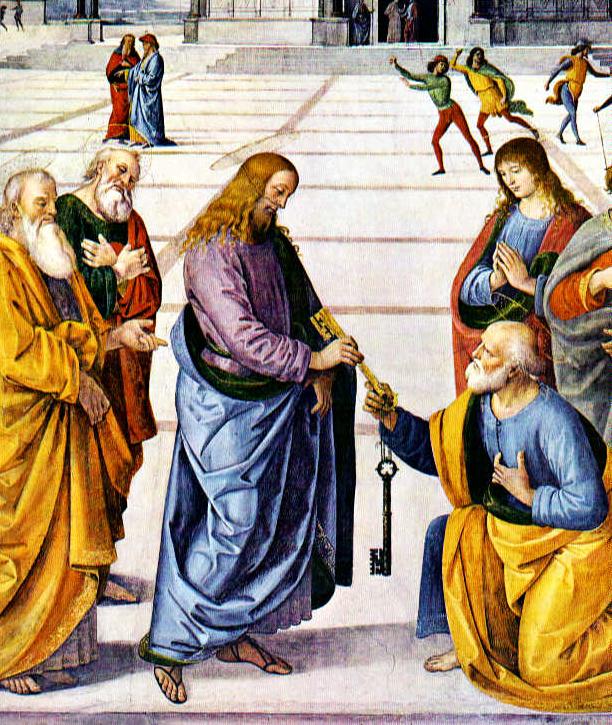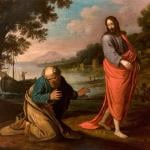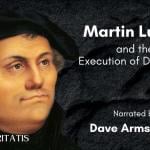
This is a collection of commentary that I have made about this passage in various articles through the years.
*****
John 21:15-17 (RSV) When they had finished breakfast, Jesus said to Simon Peter, “Simon, son of John, do you love me more than these?” He said to him, “Yes, Lord; you know that I love you.” He said to him, “Feed my lambs.” [16] A second time he said to him, “Simon, son of John, do you love me?” He said to him, “Yes, Lord; you know that I love you.” He said to him, “Tend my sheep.” [17] He said to him the third time, “Simon, son of John, do you love me?” Peter was grieved because he said to him the third time, “Do you love me?” And he said to him, “Lord, you know everything; you know that I love you.” Jesus said to him, “Feed my sheep.”
Once again, Jesus singles Peter out by name. He rarely did that with any other disciple. And He is talking about how it is Peter’s role to guide the sheep and teach the Christian flock. It’s all perfectly consistent with Petrine primacy and the papacy. Jesus is the Good Shepherd; so is Peter, in the earthly sense. The shepherd tends to his flock. Jesus’ “sheep” are clearly Christian believers. This is who Peter feeds and tends in a universal sense. How anyone could fail to see the huge ecclesiological significance here is the mystery. It’s just Protestant blinders, I reckon.
Acts 20:28 is sometimes brought up as a supposed counter-evidence against Petrine primacy: “Take heed to yourselves and to all the flock, in which the Holy Spirit has made you overseers, to care for the church of God which he obtained with the blood of his own Son.” But it’s not at all. It’s talking about bishops, who do indeed oversee flocks, but only limited, localized ones. Hence, this passage was directed to the “elders” of Ephesus, which was only one local church (what we would call today a diocese).
So they are to care for that flock, whereas Peter (singularly addressed by Our Lord) is ultimately to tend and feed the entire Church: not just a local section. I Peter 5:2 teaches the same. He is addressing elders as a collective, but Jesus addresses him alone. Peter refers to “those in your charge” whereas Jesus refers to Peter’s overseeing of His “sheep.” And Peter is addressing only elders of a particular region in Asia Minor (Turkey): “To the exiles of the Dispersion in Pontus, Galatia, Cappado’cia, Asia, and Bithyn’ia,” (1 Peter 1:1).
Peter acts like a pope would act in his second epistle, because it is directed towards all Christians: “To those who have obtained a faith of equal standing with ours in the righteousness of our God and Savior Jesus Christ” (2 Pet 1:1).
John 21 shows that Peter is singled out, as opposed to others being addressed as a collective. It’s much like referring to the President of the United States, as compared to the collectives of Senators or Congressmen in the House or cabinet members.
***
Jesus asks Peter three times if He loved Him, and when Peter replies, Jesus tells him to “Feed my lambs” (21:15) and “Tend my sheep” (21:16) and “Feed my sheep” (21:17). Why does He do that? It’s because — again — Peter was the leader, and that was what leaders do: the shepherd and the sheep who follow him: the sheep he cares for. It seems rather obvious that the deeper meaning is Peter as the Chief shepherd of and over other Christians. No one else is singled out in this fashion as he is.
***
The Greek word for “tend” in 21:16 is poimaino, which is applied to Jesus Christ in Revelation 7:17 above, and also in Matthew 2:6, and Revelation 2:27, 12:5, and 19:15. It is used of bishops in Acts 20:28 and 1 Peter 5:2 (which seems to be a passage perhaps reminiscent in St. Peter’s mind of the Lord’s charge to him). Clearly, an awesome amount of spiritual authority is being given to Peter, which includes, according to the Protestant Greek scholar W.E. Vine, “discipline, authority, restoration, material assistance of individuals.” [An Expository Dictionary of New Testament Words, Old Tappan, New Jersey: Fleming H. Revell, 1940, four-volumes-in-one edition, vol. 2, p. 88.]
The commission of Christ to Peter, then, to tend my sheep, while not exclusive to Peter in the sense that no one else (besides Christ) exercises this function (St. Peter himself says as much in 1 Peter 5:2), nevertheless is supremely unique and important insofar as no other individual disciple is likewise instructed by our Lord – and in such momentous terms (considering all of the biblical data).
Peter’s ministry to the Church is always universal; his jurisdiction knows no bounds, and the language that Christ Himself applies to him is strikingly sublime and profound. For to no one else was it granted the keys of the kingdom of heaven. No one else was renamed “Rock,” and proclaimed by Jesus to be the foundation upon which He would build His Church. And although the power to bind and loose was given to the disciples as a whole in Matthew 18:18, nevertheless, Peter is the only individual to be given this power by Christ. In other words, St. Peter has extraordinary privileges unique to himself, and in cases where they are not exclusive they are obviously applied to him in a preeminent sense.
We find then, that the scriptural relation between Christ, Peter, and the disciples (by extension, bishops and priests), is precisely that found in the teaching and practice of the Catholic Church, where the pope, more than just the “foremost among equals,” as the Orthodox and some Lutherans and Anglicans hold, is the supreme shepherd and leader of the Church, yet not in such a fashion as to exclude Christ as the Head or the Cardinals and bishops (and even laymen) as fellow members of the Body in Christ acting in organic harmony. Always, it is the pope and the Cardinals, the pope and the Council, the pope acting with due consideration of the faithful lay members of the Church, but the pope is supreme.
It is simply not necessary to dichotomize the relationship between the pope and lesser clergy. With regard to the papacy, only Catholicism does justice to both the scriptural data and the course of the early Church in the formative years of its development. One need not fall into the trap of denying the pope’s existence (and thereby doing violence to the Petrine texts as well), nor of caricaturing the Catholic Church’s doctrine of the papacy as strictly a “top-down,” “autocratic,” “monarchical” conception of Church government. In any event, the abundant Petrine evidence in the Bible must be dealt with in an open and consistent manner, whatever position one holds.
***
A. New Bible Commentary
“There are slight differences . . . in the three exhortations to Peter. The first and third use the word `feed,’ whereas the second uses the word `tend’ (Gk `poimaino’) which involves all the responsibilities of shepherding the sheep.” [D. Guthrie, and J. A. Motyer, editors, The New Bible Commentary, Grand Rapids, Michigan: Eerdmans, 3rd edition, 1970 (Reprinted, 1987, as The Eerdmans Bible Commentary), 966]
B. Adam Clarke’s Commentary
“Our Lord . . . seems to intimate [in v.16] that it is not sufficient merely to offer the Bread of Life to the congregation of the Lord, but he must take care that the sheep be properly collected, attended to, regulated, guided. Every spiritual shepherd of Christ has a flock, composed of lambs – `young converts’ – and sheep – `experienced Christians’ – to feed, guide, regulate, and govern.” [Commentary on the Bible, abridged one-volume edition by Ralph Earle, Grand Rapids, Michigan: Baker Book House, 1967 (orig. 1832, 8 vols.); Clarke was a Methodist;, p. 955]
C. Richard Baumann
“In John 21 the form of the order of authority, with the one at the helm, is clearly discernible as a revelation of enduring significance . . . As the `keeper of the keys’ was the successor of King David and the custodian of his everlasting throne, so too the Shepherd is the ruler of the nation forever. The promised Messiah was also described as the one who would feed the people of God (Mt 2:6; Jn 21:15). Jesus therefore handed His pastoral staff to one of the disciples in order that all the redeemed might be one flock under one shepherd. There must be one who guards and protects us all from the devil who is one persecutor. The one must watch over the weak and the small, and direct those who are strong, serving all men so that they may have life and full happiness in the Lord. The shepherd’s service is consequently an act of love, a return of love to Him who first loved Christ and all mankind. It is the bond of Jesus’ love, and of the love of God and the brethren, which holds the entire Church together indissolubly. This all-embracing service of the Shepherd is also extended to his fellow pastors, the priests and bishops of the Church.” [in Hans Asmussen, et al, The Unfinished Reformation, translated by Robert J. Olsen, Notre Dame, Indiana: Fides Publishers Assoc., 1961, 172-173. Baumann is a Lutheran]
D. Expository Dictionary of New Testament Words (W. E. Vine)
“`Poimaino’: to act as a shepherd . . .(b) metaphorically, to tend, to shepherd; said of Christ, Matt 2:6 . . .; of those who act as spiritual shepherds under Him, John 21:16 . . .; so 1 Pet 5:2; Acts 20:28 . . .
“In John 21:15,16,17, the Lord, addressing Peter, first uses `bosko’ [`feed’] (ver.15), then `poimaino’ (ver.16), and then returns to `bosko’ (ver.17). These are not simply interchangeable (nor are other variations in His remarks); a study of the above notes will show this. Nor, again, is there a progression of ideas. The lesson to be learnt, . . . is that, in the spiritual care of God’s children, the feeding of the flock from the Word of God is the constant and regular necessity . . . The tending (which includes this) consists of other acts, of discipline, authority, restoration, material assistance of individuals . . .” [An Expository Dictionary of New Testament Words, Old Tappan, New Jersey: Fleming H. Revell, 1940, four-volumes-in-one edition, vol. 2: 87-88]
E. Word Studies in the New Testament (Vincent)
[For 1 Peter 5:2 and Matt 2:6: same word, `poimaino’]
“The verb denotes all that is included in the office of a shepherd – guiding, guarding, folding, no less than feeding . . . There is, doubtless, a reminiscence in the word of Christ’s charge to Peter (Jn 21:15-17).”
“Homer calls kings `the shepherds of the people.’ To David the people said, `The Lord said to thee, Thou shalt feed (as a shepherd) my people Israel’ (2 Sam 5:2; cf. Ps 78:70-72). God is often called a shepherd (Gen 48:15; Ps 23:1; 77:20; 80:1; Is 40:11; Ezek 34:11-31). Jesus calls himself the good shepherd (Jn 10:11). Peter, who is bidden by Jesus to shepherd his sheep (Jn 21:16), calls him the Shepherd of Souls (1 Pet 2:25), and the Chief Shepherd (1 Pet 5:4); and in the Epistle to the Hebrews (13:20), he is styled the great Shepherd of the sheep. In Rev 2:27, rule is literally to shepherd (cf. 19:15).” [Marvin R. Vincent, Word Studies in the New Testament, Grand Rapids, Michigan: Eerdmans, 1946 (orig. 1887), 4 volumes; vol. 1: 665, 20-21]
“Poimaino” is also used of Christ in Rev 7:17: “For the Lamb which is in their midst of the throne shall feed them . . .,” and 12:5: “And she brought forth a man child, who was to rule all nations with a rod of iron: and her child was caught up unto God, and to his throne.”
***
Without doubt this is also a parallelism to Peter’s three denials, but that no more proves that Peter wasn’t pope, or not indicated as such in this passage, than David’s sin with Bathsheba and murder of her husband proved that he wasn’t king, or the subject of a covenant with God, or the writer of most of the Psalms. Paul killed Christians before God knocked him off his high horse. So what? What does the fact that a person sins have to do with anything? Isn’t that what Christianity is about? To redeem sinners? If sinners can write an inspired, inerrant, infallible Bible, they can certainly be used as infallible popes as well.
***
Patrick Madrid — in a classic article from 1992 — elaborates upon this:
Jesus is the shepherd of his flock the Church (Jn 10:16), yet he shares his shepherdhood in a subordinate way with others, beginning with Peter (Jn 21:15-17) and extending it later to others (Eph 4:11). It is true that Jesus says he is the only shepherd (Jn 10:11-16), yet this seemingly exclusive statement does not conflict with him making Peter shepherd over the flock (Jn 21:15-17) or with his calling others to be shepherds as well (Eph 4:11). Peter emphasizes that Jesus shares his role as shepherd with others by calling Jesus the chief shepherd, thus implying lesser shepherds (1 Pt 5:4). Note also that the Greek construction of John 10:16 ([there is] one shepherd, heis poimen) is the same as 1 Timothy 2:5 ([there is] one mediator, heis mesites). The apostles and their successors, the bishops, are truly shepherds also.
***
[Protestant anti-Catholic apologist Lucas Banzoli]: Nowhere in the text does Peter call the “Supreme Shepherd”. This is again Dave putting his daydreams into the text, rather than extracting from the text simply what the text says.
What do we call the folks who feed and tend sheep? Shepherd, of course. Jesus is commissioning Peter to tend to His sheep (i.e., Christians). That is precisely being Jesus’ chief shepherd. Jesus says this to no other of His disciples.
[Lucas Banzoli] To make matters worse, in 1 Peter 5:1-2, Peter himself explicitly says that “I do so as an elder like them”, not as a superior, as Dave claims. If he was right in his thesis that John 21:15-17 refers to a “Supreme Shepherd” and in these other texts only to “subordinate shepherds”, Peter would have said that “I do so in the capacity of a Supreme Shepherd above them”, and not “an elder like them”.
Exactly! Just like Jesus said, “For the Son of man also came not to be served but to serve” (Mk 10:45). Jesus washed their feet, and said, “No longer do I call you servants, for the servant does not know what his master is doing; but I have called you friends,” (John 15:15) and “You know that the rulers of the Gentiles lord it over them, and their great men exercise authority over them. It shall not be so among you; but whoever would be great among you must be your servant, and whoever would be first among you must be your slave” (Mt 20:25-27). St. Peter, then, is quite obviously following Jesus’ example of humility.
*
***
*
Summary: I provide commentary from past articles of mine on the “Petrine passage, John 21:15-17, where Jesus tells St. Peter to “Feed my lambs,” “Tend my sheep,” and “Feed my sheep.”













